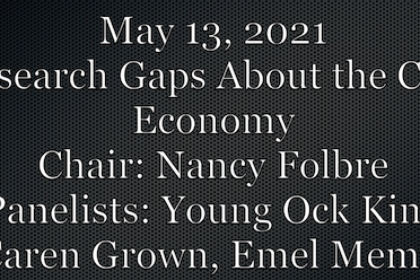
To wrap up the second day of the Concluding Annual Meeting, Dr. Nancy Flobre (University of Massachusetts Amherst) chaired a discussion on future avenues for research in the field of care economy. Young Ock Kim (Korean Women’s Development Institute) suggested modifying existing macroeconomic models and going beyond the models being used currently. Kim pointed out that research could also focus on the recovery from the COVID-19 pandemic and that some surveys might need to adjust their timelines to make sure that the effects of the pandemic are captured. Finally, it is vital to encourage young researchers to engage in care economy research, and a research fund could achieve this objective.
Dr. Emel Memiş (Levy Institute) emphasized the importance of gathering quality information for future research. Memiş’highlighted current data challenges such as the lack of complete information on income and consumption patterns of the households, the need for more classifications for time use data and detailed information on paid work time use and paid work activities, the lack of data on the intersection of inequalities such as regional inequalities, and ethnic-based inequalities. In conclusion, high-quality data is necessary for research that encapsulates all aspects of wellbeing, economic and non-economic life activities.
The need for strategies to incorporate new technology to collect data and disseminate research findings was Dr. Caren Grown’s (World Bank) main message. Furthermore, research needs to focus on low-income, low resource, transitioning, and emerging economies so that models could be developed to include the idiosyncrasies of these types of economies. When conducting research, it is also important to distinguish between different risk profiles and the different types of care populations. Grown encouraged the research community to be innovative in disseminating research findings to reach a wider audience.
To watch the full presentation, see below.
Written by Praveena Bandara, Research Assistant for the Care Economy Project and PhD student in Economics at American University.
